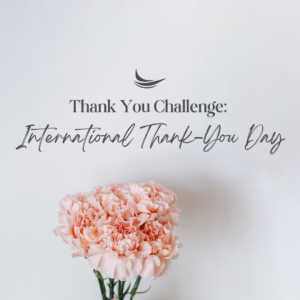International Thank-You Day: Thank You Challenge
International Thank-You Day is celebrated each year on January 11th.
Too often, we assume other people know we are thankful and do not take the time to express gratitude. The challenge for this month is for you to practice expressing gratitude by giving thanks to at least one person in your life.
Gratitude has many health benefits. These include helping reduce depression, lessening anxiety, and supporting overall mental health. The simple act of expressing thanks can help rewire your thinking, improve relationships, and boost self-esteem. Improved sleep and reduced stress have also been associated with practicing gratitude.
To get started, reflect on those who have been part of your life journey and those who are currently making a positive impact on your well-being.
Think about people in your life who have made your life better in some way. It can be helpful to write down as many names that come to mind as a brainstorming activity. Here are some examples—
- Parent(s)/ parental figures
- Friends & family
- Mentor or spiritual leader
- Therapist
- Supervisor/ Manager
- Colleagues
Identify someone who you would like to thank.
Pick at least one person that you would like to take a moment to express thanks to this month by writing a thank you note.
Name what you are thankful for.
After identifying who you would like to thank, next name what you are thankful for. Perhaps it is something nice that they have done for you. Maybe it was something that they said that made a difference in your life. The power and influence of a particular relationship is another example.
Give specific examples to write about and share the impact this has made.
Think of a specific example where and when someone has made your life better in some way. Share specific examples of why this is meaningful, and the positive feelings associated with this experience. There are some excellent examples online to help you express your message and create letters.
Consider expressing thanks directly to the receiver.
If it is possible, express gratitude directly to the person you would like to thank. This expression is both an act of courage and vulnerability that is such as powerful expression as you look at the receiver and see the impact of your message firsthand.
Expand the challenge beyond January by implementing gratitude as a practice.
If you would like to challenge yourself beyond January, create a practice of sending and/ or sharing at least one gratitude letter a month. This is such a powerful activity for both the giver and the receiver as giving thanks can make you happier and set the foundation for a new year. Now is also an excellent opportunity to either start or continue writing in a gratitude journal.
Written By: Charlotte Johnson, MA, LPCC




























